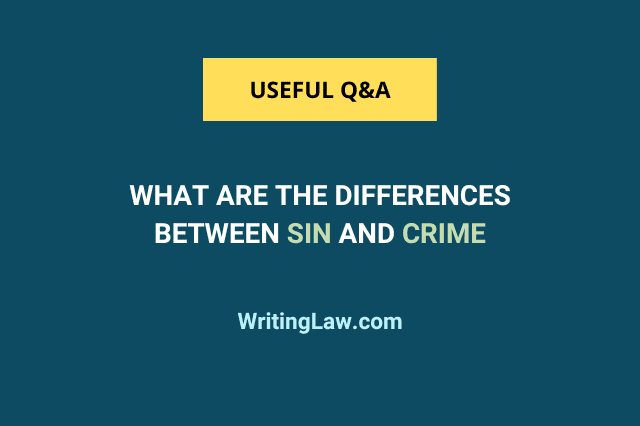
The distinction between right and wrong is different at an individual, societal, and international level. In this relation, we have the concepts of sin and crime. An act or behaviour may be a sin, but it is not necessary that it is punishable by law as well.
What Is Sin?
Sin can simply be defined as an action or way of behaving that is not allowed by religion, something considered incorrect by God, or an offence against religious law.
What Is Crime?
Crime can be defined as legal wrong. It’s a form of conduct that has been declared socially harmful in a state and forbidden by law. Defying this law leads to punishment.
Must See: 8 Kinds and Theories of Punishment
Essentials of Crime
These are the essentials of crime:
- A crime must be committed by a person.
- There must be some harm or injury to another person.
- There must be an act (Actus Reus) which is prohibited by law
- There must be a guilty mind of the person committing the crime, that is, Mens Rea.
Differences Between Sin and Crime
Let us now discuss the difference between sin and crime.
Sin: Sin is provided in respective religious books of different religions.
Crime: It is the set of rules that are provided in criminal statutes; those are the Indian Penal Code (IPC), Criminal Procedure Code (CrPC), etc.
Sin: It results in violation of rules of religion.
Crime: It includes a breach of law.
Sin: A person committing sin is punished by God.
Crime: A person committing a crime is punished by the state.
Sin: There is no direct harm or injury involved.
Crime: In crime, injury is an essential element.
Sin: The remedy for sin is penance.
Crime: Remedy for crime is subjected to a term of sentence by the court of law.
Sin: A sin is an act or behaviour that is against religion or God’s will.
Crime: Crime is an action against the law.
Sin: It is recognised by God or religion.
Crime: It is recognised by the state or government.
Sin: It is a religious concept.
Crime: It is a legal proposition.
Sin: It is a subjective term and specifically refers to something that has no base to measure a degree of punishability.
Crime: It is the set of rules by social codes of the nation, and on breach of such rules, punishment is provided.
Conclusion
Every crime is a sin, but every sin need not be a crime. For example, adultery is a moral wrong and is considered a sin. At the same time, adultery is not a crime because it is not made punishable under any law in India.
Thus, if a crime is committed, it would be punishable by law, and if a sin is committed, it would be punishable after the death of the sinner (by God).
Read Next:
1. What Are White-Collar Crimes?
2. 4 Stages of Crime Under the Indian Penal Code
3. Definition of Crime and its Essential Elements – Indian Penal Code
4. Can a Person Be Forgiven for Crime Done Under Alcohol Influence
- What Is Anticipatory Breach of Contract Under Contract Act? - 13th July 2024
- Who May File Written Statement (With Its Time Limit and Rules) - 31st May 2024
- Who Is a Legal Representative? - 30th May 2024







